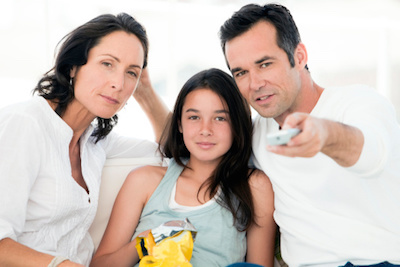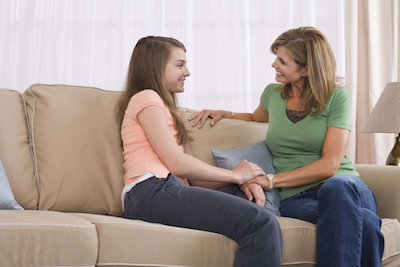Should your teen watch 13 Reasons Why?
If you have a teen or pre-teen in your house, you may have heard about the popular Netflix series generating a lot of buzz lately called 13 Reasons Why. It’s a show for and about teens adapted from a popular young adult novel of the same name, but it’s the controversial subject matter that has everyone from psychiatrists to school administrators ringing alarm bells.
The wildly popular show centers around a young girl, Hannah, who has committed suicide. Her friend, Clay, discovers after her death a series of cassette tapes she left behind explaining the 13 reasons that led to the decision to end her own life. The show depicts situations in which Hannah endures bullying by her classmates and finds her school counselor to be unsympathetic and ineffective in helping her deal with her problems. In addition to dealing with the difficult topic of suicide that is portrayed in a graphic manner, the show portrays sexual abuse, rape, gun violence, illegal substance abuse and underage drinking.
What’s all the controversy about?
 While advocates of the show contend that it is a real and honest depiction of teenage life and a catalyst for important conversations, many mental health professionals and school administrators are concerned about the message this show sends to teens. It appeals to teens because it taps into the feelings of angst and isolation in a raw way, but many adults feel that the message to struggling teens is this: there is no hope and there’s no one you can trust. Hannah’s character is failed by her parents and the adults within her school who’ve been tasked to help kids like her, making it seem as though suicide were her only way out.
While advocates of the show contend that it is a real and honest depiction of teenage life and a catalyst for important conversations, many mental health professionals and school administrators are concerned about the message this show sends to teens. It appeals to teens because it taps into the feelings of angst and isolation in a raw way, but many adults feel that the message to struggling teens is this: there is no hope and there’s no one you can trust. Hannah’s character is failed by her parents and the adults within her school who’ve been tasked to help kids like her, making it seem as though suicide were her only way out.
Beyond that, many people feel as though 13 Reasons Why glamorizes the idea of suicide. While the physical act of suicide is not glossed over in the show, it’s the idea of a teen finally getting to tell her side of things, to show everyone why she did it and to finally be known and understood through her death in a way she was unable to achieve in life that may make the act of suicide seem appealing to teens.
It’s important to note as well that in some ways suicide can often be thought of as a contagious problem. That doesn’t mean that everyone is susceptible to the idea of harming themselves, but there is evidence that it can be shared among groups. For teens who are already struggling with symptoms of mental illness (depression or anxiety that may not even be recognized or diagnosed, for example), experimenting with substance abuse, experiencing bullying or other emotional trauma, their minds are fertile ground for thoughts of harming themselves. And it is within these groups where seeing suicide depicted onscreen can be very dangerous.

Should your kids watch it?
I can’t tell you whether your kids should watch this show or not. That’s a very personal choice to be made within your household and likely to depend heavily on the individuals concerned. However, if you do choose to let your teen watch it (or they’ve already watched it), it would be wise to talk with them about it to help them work through what they’ve seen.
What should you talk about with your kids?
I have adapted for you some talking points that were developed by Suicide Awareness Voices of Education (SAVE) and are endorsed by our network of mental health professionals here at Arnold Palmer Hospital.
If your teen is planning to watch 13 Reasons Why, here are some things you should talk about with them:
-Keep in mind this is a fictional story, not something that happened in real life.
-You may identify with some of the thoughts and feelings portrayed here. Many people identify with characters on TV and in movies. However, it’s important to recognize that there are healthy ways to cope with these feelings, and suicide is not one of them.
-There is always someone who is willing to listen. If you feel like you need support or someone to talk to, reach out to a trusted friend, family member, counselor or therapist.
-Most people who experience bullying, the death of a friend, or other emotional traumas do not commit suicide. It is not a common response to adversity. The vast majority reach out to others, seek help, find healthy ways to cope and go on to lead healthy, normal lives.
-Suicide is never a heroic or romantic act. Hannah’s death in the show should be rightly viewed as a tragedy and a cautionary tale.

-When you die, you do not get to make a movie or talk to people any more. Leaving messages from beyond the grave is a dramatization produced in Hollywood and is not possible in real life.
-How the guidance counselor in the show responds to Hannah’s thoughts of suicide is not appropriate and is not typical of most counselors. School counselors are professionals and a trustworthy source for help. If your experience with a school counselor or other adult is unhelpful, seek other sources of help such as a crisis line.
-While not everyone will know what to say or have a helpful reaction, there are people who do. Keep trying to find someone who will help you.
-If someone tells you they are suicidal, take them seriously and get help immediately.
-If you’re struggling with thoughts of suicide, text “START” to 741741 or call 1-800-273-TALK (8255).







